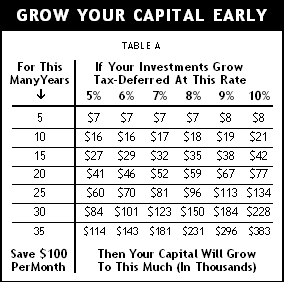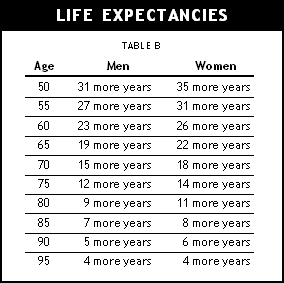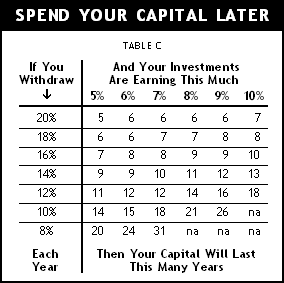
Building Your Retirement Assets and Making Them Last
During our working years, we must strike that balance between income and spending that allows us to generate a monthly surplus. Many take the short-term (and potentially disastrous) view that "as long as we're paying our bills, our finances are in good shape." Without a regular monthly surplus, however, they will not be able to accumulate the investment capital that is needed to provide long-term financial security.
The earlier you begin your program of accumulation, the harder your monthly surplus will work for you. Dollars invested during your 20s are much more valuable than dollars invested during your 40s. Table A shows the effects of putting aside $100 a month over various periods of time. You can see that the rate of return you earn on your investments has less impact in the early years. For example, after ten years a 10% return accumulates $5,000 more in capital than does a 5% return. Over twenty years, the difference grows to $36,000, and after thirty years, skyrockets to $144,000. Many make the mistake of postponing the life-style sacrifices necessary in order to have a monthly surplus. They later try to make up for lost time with higher-risk investments, but rarely can they catch-up to where they would have been if only they had started earlier.

A fundamental fact of retirement life is that you don't want your money to run out before you do! For a reasonable guess as to how long you'll live in retirement, let's consider the case of 65 year-old males as shown in Table B below. On average, a man who lives to age 65 goes on to live another 19 years. Roughly half of this age 65 group will live more than 19 years and half will live less. To be on the safe side, financially speaking, you have to assume you'll be in the surviving group. If you make it to age 85, your expected life span is increased another seven years. That means, in the absence of health reasons to the contrary, your goal should probably be to have enough money to support yourself (and your spouse, if married) into your 90s.

Naturally, you hope to have enough capital accumulated so that your interest and dividend income during retirement, when taken along with the income from your pension at work and Social Security, will be adequate to meet the financial demands of your later years. If not, you'll be forced to supplement your income by withdrawing some of your capital. Table C below shows how long your capital will last if this happens.
 For example, if you have $100,000 in capital earning 8%, and you begin taking 14% a year out ($14,000), you will have spent all your savings in about 11 years. If you only took 10% a year out ($10,000), your savings would last 21 years. The careful and measured withdrawal of capital, when necessary, can be a legitimate part of your retirement planning strategy.
For example, if you have $100,000 in capital earning 8%, and you begin taking 14% a year out ($14,000), you will have spent all your savings in about 11 years. If you only took 10% a year out ($10,000), your savings would last 21 years. The careful and measured withdrawal of capital, when necessary, can be a legitimate part of your retirement planning strategy.



